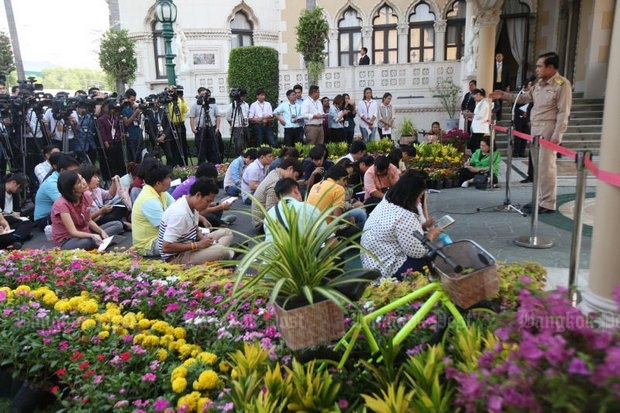
The relationship between the military and most media outlets is not bad, even though it is not completely friendly either. So why is the regime's reform body proposing a bill to control the media?
Hated by both journalists and consumers, this senseless bill will let government officials and outsiders regulate the Thai press. It will not benefit anyone but governments and their bureaucratic arms who can easily escape scrutiny. And the only incentive for this regime to not kill the bill is its aspiration to prolong its executive power or rise to the top, again.
I am not being overly negative. The military has managed to curb its dissenters. The constitution it sponsored will grant it more power through the selection of senators. Then its lawmakers revised the Computer Crime Act that will allow oversight by the state over people's lives. It has paved the way for calm and order. Taking control of the media is a logical next step that can help maintain calm.

Surasak Glahan is deputy oped pages editor, Bangkok Post.
If the bill becomes law, the Thai press will be dragged into unfamiliar territory of harsh state controls experienced by their peers in neighbouring countries like Vietnam, China and Laos, while consumers can expect more uniform coverage, less diverse content and self-censorship by the messenger.
I still remember being at a press conference in Vietnam and feeling sorry for a Vietnamese journalist who was warned onsite by a high-level government official over her "inappropriate" question. "It's ok," she told me later without showing any sign of frustration. She and her colleagues there know the rules of the game, she said.
Now that kind of rule is being initiated as the controversial bill and the game will be played by a media professional council comprising five members from the media, four permanent secretaries and another five people from other sectors.
The bill proposes the establishment of the council who will have power, through licensing, to decide who can and cannot work as reporters, writers, photographers, cartoonists and editors. It will also determine what ethical and professional standards are.
The Thai press will have to be prepared for the backward reform, apply for a licence to work for the first time and toe the line. Following the 2014 coup, the BBC World Service seemed to see this kind of control coming. It has since revived its Thai service, scrapped in 2006, to give an alternative Thai-language news channel to Thai consumers.
The Computer Crime Act impacts civil liberties as it will foster a Big Brother type society. Now comes the media regulation bill that will "oversee and streamline ethical standards of the media", as described by ACM Kanit Suwannate, chairman of the National Reform Steering Assembly's media reform steering panel who proposed the bill.
"If you don't do anything wrong, there's nothing to fear," he said.
Well, no media professionals can trust his words given that ethics and standards are yet to be drafted. And none of us can trust that these 13 people -- the majority of whom are not working journalists, will deliver sensible ethics and standards.
None of us can afford to be too complacent. This is not just about limiting press freedom, but a step further for more complete control over the Thai public.
The regime has no reason to endorse the bill if it does not aspire to become the next government. The media have not been as critical and hostile toward the current military government as they were to previous civilian governments. Likewise, the military has not interfered with the media's business as much as was allegedly done by civilian administrations.
It is true that there's still room for improvement for Thai media outlets when it comes to their integrity, impartiality and subjectivity. But this is not the regime's business. Most media organisations already have their own codes of conduct. The defamation law forces every journalist to be accurate and truthful in their reporting. Poor quality of content, biased reporting or a lack of diversity will all be judged by readers and consumers, who will hold the entire press sector accountable.
The proposed law will merely take us back to the time when we had a media censorship board before it was scrapped following the birth of the now-resolved 1997 People's Constitution. If that kind of censorship is brought back, governments and public offices will not be effectively watched by the media.
We can only hope that this useless bill will be killed by the cabinet and the National Legislative Assembly if this regime is sincere in keeping its word to not further pursue power or prolong it.
